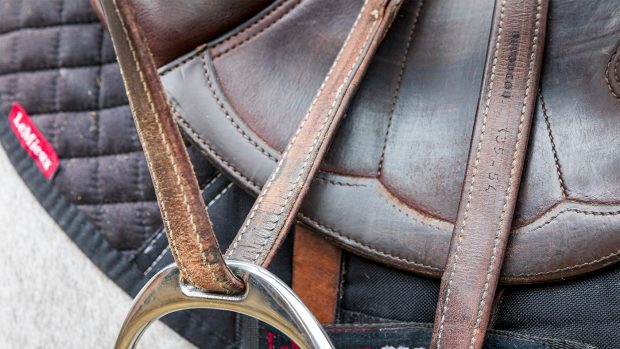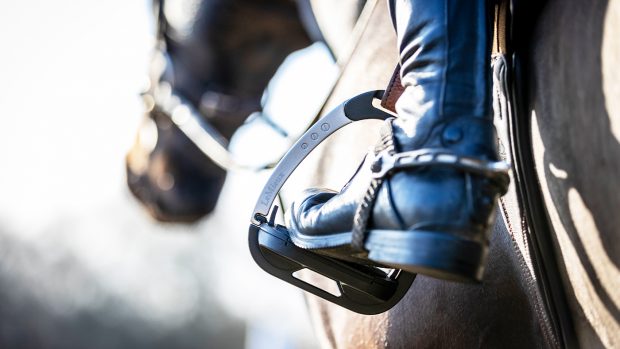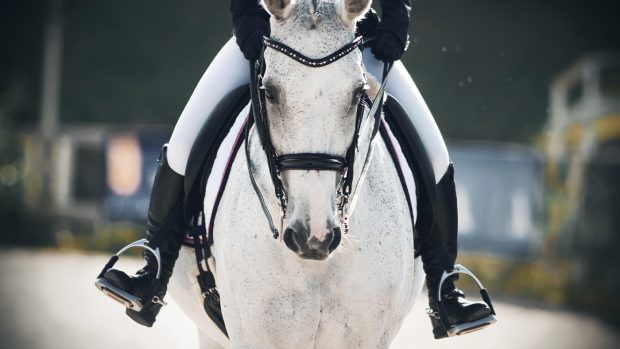There are some fantastic savings to be had when you buy secondhand equestrian kit, but it’s also easy for problems to arise. Whether you’re buying items at an equestrian table top or car boot sale, or buying from an online marketplace, we have some top tips to help you buy used tack, rugs and other equipment safely.
1. One of the downsides of buying online is that you can’t physically inspect the items before paying for them and when buying secondhand tack in particular, you need to inspect it carefully for weak spots. Master saddler Malan Goddard says the most common weak points are stitching, anywhere leather is turned and sewn to take a buckle, areas around holes, and anywhere that metal rests on leather.
2. If a bridle has billet hook fastenings, make sure the holes in the billet-place covers have not enlarged so the billet is loose. Check all buckle holes for enlargement and splits.
3. Girths should be checked where leather turns through buckles. On saddles, check girth straps for wear and tear, and check the webbing attachments are in good condition. “Pull hard to check stitching, especially on stirrup leathers,” Malan advises. “They have to bear a lot of weight.”
4. A damaged saddle tree may harm a horse’s back. Damage can range from a hairline fracture or a popped rivet, which may squeak but will only show when a saddle is stripped down, to an obvious break — which is why buying a saddle that has been checked by a professional saddler is so much safer.
5. If you buy tack or bits on trust, has the seller measured it correctly? It’s annoying when a supposedly 5in bit turns out to be 5.5in, or a 6ft rug turns out to be 6ft6 — and measuring saddles between D-rings isn’t an accurate indicator of tree width.
6. Never buy secondhand riding hats — it isn’t worth the risk. We also wouldn’t recommend buying second-hand body protectors.
7. Equine vet Lucy Grieve recommends disinfecting secondhand items with an appropriate product to avoid disease transmission. It might not be life-threatening if your horse contracts ringworm from a previous sufferer’s rug, but it will be inconvenient and expensive. Commercial rug wash prices vary, but will always be cheaper than a vet bill.

Equine Bio Genie | Ebay.co.uk
Use this multi-purpose equine-specific spray to disinfect your kit – and there’s no need to wipe or rinse it off once applied.
8. If buying online, take extra care. Unfortunately there are people who sound very plausible who are advertising items for sale that they don’t have. A legitimate seller should be able to provide an image of the item they are selling pictured with a piece of paper that has their name and the date on it. This proves that they do have the item they are offering.
Legitimate sellers will also be happy to accept payment sent via PayPal goods and services – although they may want to add the PayPal fees on top. If you pay for an item via bank transfer or PayPal friends and family you have no protection and no way to get your money back if your item doesn’t arrive.
Also don’t accept email invoices sent to you by the seller that appear to come from PayPal, as this is another way of scamming money from you. And remember, if something feels too good to be true, it probably is, so if in doubt, walk away.
You might also be interested in:
What therapy regimes do top riders follow in order to keep their horses in peak condition? Stephanie Bateman investigates...

Therapy regimes: how do the pros keep their horses at the top of their game?

8 half pads to consider to help perfect your saddle setup

Subscribe to Horse & Hound this spring for great savings
Horse & Hound magazine, out every Thursday, is packed with all the latest news and reports, as well as interviews, specials, nostalgia, vet and training advice. Find how you can enjoy the magazine delivered to your door every week, plus options to upgrade your subscription to access our online service that brings you breaking news and reports as well as other benefits.





